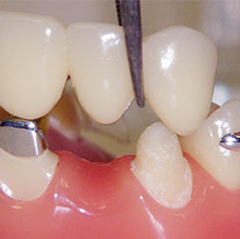
As the name suggests, a crown is a cap or covering for a tooth. It is used when your tooth is discoloured, cracked or broken, heavily filled or if fillings have been lost.
There are many different types of dental crowns available from your National Dental Care dentist. Your dentist will advise the best option depending on the location of the crown. They may recommend a ceramic, resin or sometimes even gold crowns.
Our dentists use their expertise and modern technology to match the new crown to the shape of your existing teeth and their colour.
Many of our National Dental Care dentists offer Same Day Crowns using CAD/CAM technology to design, produce and insert ceramic restorations all in one single appointment. Find out which practices offer Same Day Crowns.
If you feel that your teeth are becoming more transparent or becoming darker in color, they may be wearing down. Your dentist will discuss the reasons behind this as it is important that they are addressed first. If your dentist recommends a crown restoration, then this crown will be fabricated to resemble the natural shape and strength of your existing tooth through the use of a ceramic material.
If your teeth are heavily filled, they may be at risk of fractures or de-bonding of fillings. Frequent replacement of fillings can lead to loss of precious tooth structure. Repeated dental treatment on the same tooth may lead to deepening of the filling and subsequent nerve inflammation. To avoid these complications, your dentist may recommend that a crown is constructed before the filling becomes too large and remaining tooth structure is too short to support a crown.
If your tooth is showing fine lines and cracks or you occasionally feel sensitivity when biting into sticky or hard foods, your tooth may have a deep crack or may be at risk of complete fracture. This is common for heavily filled teeth, especially where an amalgam filling is in place. Your dentist may recommend a crown to restore the tooth and protect its cusps from splitting apart and may suggest replacing any amalgam with a ceramic restoration.
If a tooth is missing or lost, your dentist will discuss the options for tooth replacement. This may involve the placement of an implant or tooth supported bridge. If two or more teeth directly adjacent to the lost or missing tooth are at risk of fracture or are discoloured and need crowns, a bridge may be a good option to replace the missing tooth. When the bridge is produced, a porcelain tooth (pontic) is fused to the two or more crowns on either side and once the crowns are fitted onto the adjoining teeth, the porcelain pontic appears to be emerging out of the gum. A bridge may be a suitable course of treatment for you if you are unable to have an implant due to issues with your overall health or dental health.
Root canal filled teeth are prone to fractures, due to the nature of root canal treatment and hollowing out of the tooth in the process. Dentists highly recommend crowning most root canal filled teeth to protect them from fractures and further bacterial infections.
A dental bridge is a ceramic structure, spanning the gap left by a missing or extracted tooth. A ceramic tooth (pontic) is fused between two or more porcelain crowns on either side of the missing tooth that serve as anchors.
The anchor teeth are shaped to accommodate the crowns and then a bridge is bonded securely over these teeth.
Your National Dental Care dentist will take an impression or a digital scan of your mouth and then using technology and training will design a ceramic tooth to insert between the two existing crowned teeth.
The pontic tooth and the crowns on either side are matched to the colour and the shape of your existing teeth.

Use emergency dental service to find emergency dentists near you that have the ability to care for all dental emergencies that may occur unexpectedly. Our patient support center is open to take emergency calls 24 hours a day 7 days each week and will connect you with multiple dentists that have walk-in appointment hours. To get started, call our 24/7 emergency dental service number: 1-888-350-1340, enter your zip code, and then wait to be connected with a dentist near you.
Emergency Weekend Dentist
Emergency Weekend Dentist
Emergency Weekend Dentist
Emergency Weekend Dentist
Emergency Weekend Dentist
Emergency Weekend Dentist
Emergency Weekend Dentist
Emergency Weekend Dentist
Emergency Weekend Dentist
Emergency Weekend Dentist